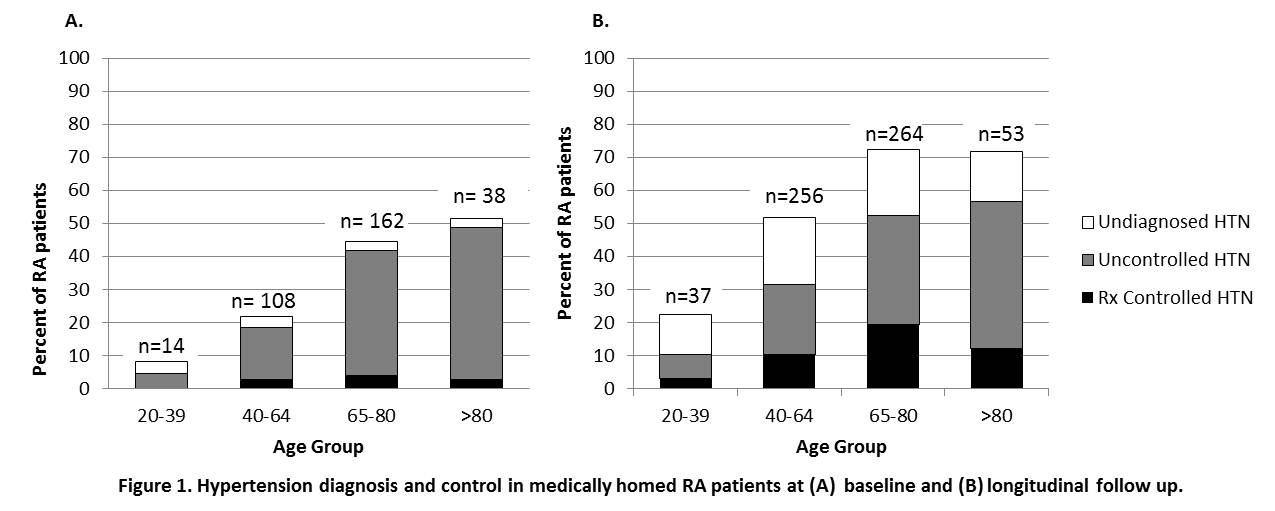Session Information
Session Type: Abstract Submissions (ACR)
Longitudinal Hypertension Diagnosis and Control among a Primary Care Medically Homed Population with Rheumatoid Arthritis
Background/Purpose: Hypertension is a key risk factor for cardiovascular disease (CVD) in patients both with and without rheumatoid arthritis (RA). In their review on hypertension in RA, Panoulas et al (2008) cited relative risks of hypertension for CVD events ranging from 1.5 to 4.3. Reports vary further regarding hypertension prevalence in RA largely due to varying case definitions and timing of observations. Herein we examined hypertension prevalence, diagnosis and control using standard Joint National Committee-7 (JNC-7) hypertension diagnostic criteria applied to a medically homed RA population.
Methods: Using a cohort design we studied all adult patients with rheumatoid arthritis who were medically homed receiving primary care and rheumatologic care within a large multispecialty practice. Patients were considered “medically homed” for each consecutive year (2005-2011) that they met definitions requiring ≥2 visits over a 24 month baseline (including at least 1 primary care visit and 1 rheumatology visit). RA was determined using algorithms requiring two ICD-9 claims of 714.0-714.4 in 24 months (modified Katz 1997, MacLean 2000). Hypertension diagnosis eligibility was defined by applying Joint National Committee-7 (JNC-7) hypertension diagnostic criteria: 3 or more blood pressures >140/90 or 2 or more pressures >160/100 on >2 separate visits. An algorithm was used to search for >1 ICD-9 hypertension code (Tu 2007) or any antihypertensive medication to indicate hypertension diagnosis. Total hypertension prevalence counted diagnosed and undiagnosed cases meeting JNC definitions. Control was also based on JNC-7 criteria requiring 3 normal blood pressures <140/90. Descriptive statistics were used to report hypertension prevalence, diagnosis and control during the baseline and subsequent medically homed period.
Results: In our population of 1,099 medically homed RA patients (mean age 56; 76% female) the prevalence of hypertension was 30% at baseline and 56% during follow up. Hypertension generally increased with age (Fig.1). Compared to older patients, a higher proportion of younger patients remained undiagnosed. Although older patients were more often diagnosed, three quarters remained uncontrolled.
Conclusion: Our examination of medically homed RA patients receiving both primary care and rheumatology care highlights the importance of examining longitudinal data for assessing diagnosis and control of hypertension among patients with RA. These data illustrate that point prevalence estimates may under report hypertension rates relative to standard JNC definitions using multiple observations. Overall, young hypertensive RA patients were proportionally less likely to be diagnosed and control remained poor across all age groups.
Disclosure:
K. Voelker,
None;
C. M. Bartels,
None.
« Back to 2012 ACR/ARHP Annual Meeting
ACR Meeting Abstracts - https://acrabstracts.org/abstract/longitudinal-hypertension-diagnosis-and-control-among-a-primary-care-medically-homed-population-with-rheumatoid-arthritis/

